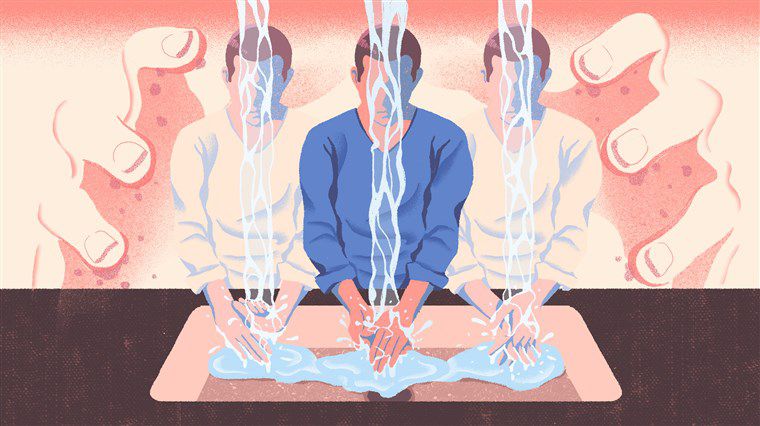User blogs

Borderline Personality Disorder (BPD) is a mental health condition that affects about 1.6% of the population. It is characterized by intense and unstable emotions, impulsive behaviors, and difficulty in maintaining relationships. Living with BPD can be challenging, but with proper treatment and coping strategies, individuals can learn to manage their symptoms and lead fulfilling lives. In this blog post, we will discuss the symptoms, treatments, and coping strategies for BPD.
Also Read: OCD Treatment in Bhopal
Symptoms of BPD:
BPD is a complex disorder, and its symptoms can vary from person to person. However, some common symptoms include:
1) Intense and unstable emotions: People with BPD often experience intense emotions that can change rapidly. They may feel extreme anger, sadness, or anxiety, and these emotions can be triggered by seemingly insignificant events.
2) Impulsive behaviors: Individuals with BPD may engage in impulsive behaviors like reckless driving, overspending, substance abuse, or binge eating. These behaviors are often used as a coping mechanism to deal with intense emotions.
3) Fear of abandonment: People with BPD may have a deep fear of being abandoned by their loved ones. This fear can manifest in clingy and controlling behaviors in relationships.
4) Unstable self-image: Individuals with BPD may struggle with a sense of self. They may have a distorted self-image and struggle to maintain a consistent sense of identity.
5) Difficulty in maintaining relationships: The intense emotions and impulsivity associated with BPD can make it challenging to maintain stable and healthy relationships.
Also Read: Psychiatric Doctor in Bhopal
Treatments for BPD:
BPD is a treatable condition, and seeking help from a psychiatrist doctor in Bhopal is the first step towards recovery. Some effective treatments for BPD include:
1) Psychotherapy: Psychotherapy, also known as talk therapy, is the most common and effective treatment for BPD. It can help individuals learn coping strategies, regulate their emotions, and improve their relationships.
Also Read: Mental Doctor in Bhopal
2) Medications: While there is no specific medication for BPD, certain medications can help manage the symptoms. Antidepressants, mood stabilizers, and antipsychotics may be prescribed to help with mood swings, impulsivity, and other symptoms.
3) Dialectical Behavior Therapy (DBT): DBT is a type of psychotherapy specifically designed for people with BPD. It focuses on teaching skills like mindfulness, emotion regulation, and interpersonal effectiveness to help individuals manage their symptoms.
Nutrition plays a crucial role in our
overall health, including our mental health. The food we eat not only nourishes
our body but also has a significant impact on our mood, emotions, and behavior.
In recent years, there has been a growing interest in the connection between
nutrition and mental health, and many studies have shown that a healthy diet
can have a positive effect on our mental well-being.
As a psychiatrist in
Bhopal, I have seen firsthand the impact of nutrition on mental health. In my
practice, I have noticed that patients who follow a balanced and nutritious
diet tend to have better mental health outcomes compared to those who have a
poor diet. This observation is supported by numerous studies that have linked
nutrition to various mental health conditions such as depression, anxiety, and
even schizophrenia.
One of the ways nutrition affects
mental health is through the production of neurotransmitters in the brain.
Neurotransmitters are chemical messengers that regulate mood, emotions, and
behavior. Certain nutrients, such as omega-3 fatty acids, B vitamins, and amino
acids, are essential for the production and functioning of these
neurotransmitters. A deficiency in these nutrients can lead to imbalances in
the brain, causing mood swings, irritability, and other mental health issues.
Also Read: Mental Doctor in
Bhopal
Moreover, our gut health also plays a
crucial role in our mental well-being. The gut is often referred to as the
"second brain" because it contains millions of neurons that
communicate with the brain through the nervous system. The gut and brain are
connected through the gut-brain axis, and any disruption in this communication
can lead to mental health problems. A healthy gut microbiome, which is the
community of bacteria in our gut, is essential for maintaining good mental
health. A diet rich in fiber and probiotics can help promote a healthy gut
microbiome, leading to improved mental health.
Also Read: OCD Treatment in
Bhopal
On the other hand, a poor diet, high
in processed and sugary foods, has been linked to an increased risk of mental
health issues. Studies have shown that a diet high in processed foods, such as
fast food and refined carbohydrates, can increase the risk of depression and
anxiety. These foods can cause inflammation in the body, including the brain,
which can affect mood and behavior. Additionally, a diet high in sugar can lead
to blood sugar spikes and crashes, causing mood swings and irritability.
Having a positive mindset is crucial
for leading a happy and fulfilling life. It allows us to see the good in every
situation and approach challenges with optimism and resilience. However,
building a positive mindset is not always easy, especially in today's
fast-paced and stressful world. But with the help of a psychiatrist in
Bhopal, you can learn how to cultivate a positive mindset and improve your
overall well-being.
Here are
some tips on how to build a positive mindset:
1. Practice gratitude: One of the
best ways to cultivate a positive mindset is by practicing gratitude. Take a
few minutes every day to reflect on the things you are grateful for in your
life. It could be something as small as having a roof over your head or
something as big as achieving a personal goal. By focusing on the positive
aspects of your life, you can shift your mindset from one of lack to one of
abundance.
2. Surround yourself with positivity:
The people we surround ourselves with have a significant impact on our mindset.
Therefore, it is essential to surround yourself with positive and supportive
individuals who uplift and inspire you. Avoid spending time with people who are
negative or constantly bring you down. Instead, seek out those who share your
values and have a positive outlook on life.
Also Read: OCD Treatment in
Bhopal
3. Challenge negative thoughts: We
all have negative thoughts from time to time, but it's crucial to challenge
them and replace them with positive ones. When you catch yourself thinking
negatively, ask yourself if there is any evidence to support that thought. If
not, try to replace it with a more positive and realistic thought. This
practice, known as cognitive restructuring, can help you develop a more
positive and optimistic outlook.
4. Take care of your physical and
mental health: Our physical and mental well-being are closely linked to our
mindset. Therefore, it is crucial to take care of both. Make sure to get enough
sleep, exercise regularly, and eat a healthy diet. Also, seek help from a psychiatrist in Bhopalif you are struggling with any
mental health issues. They can provide you with the necessary support and
guidance to improve your overall well-being.
5. Practice self-care: It's essential
to take care of yourself and prioritize your needs. Make time for activities
that bring you joy and relaxation, whether it's reading, painting, or spending
time in nature. Self-care is not selfish; it is necessary for maintaining a
positive mindset and preventing burnout.

Mental health is an important part of
overall well-being, but it can be difficult to maintain. Fortunately, there are
some simple daily habits that you can practice to help boost your mental health
and keep yourself feeling good. Here are five daily habits that will make a
positive difference in your life:
Exercise– Regular physical
activity helps reduce stress and anxiety while increasing energy levels and
improving moods. Try going for a walk or jog each day or doing yoga at home if
the weather isn’t cooperating outside.
Also Read: OCD Treatment in Bhopal
Connect with
Nature–
Spending time outdoors in nature has been proven to improve mental clarity as
well as reduce stress levels significantly; so take advantage of any
opportunity you have during the day to get out into nature! Whether it’s just
taking a few minutes for lunch outside on nice days or going for longer hikes
on weekends, being surrounded by natural beauty will do wonders for your
mindset!
Eat Healthy
Foods–
Eating healthy foods like fruits, vegetables, whole grains, and lean proteins
not only provides essential nutrients our bodies need but also helps us stay
mentally alert throughout the day. Avoid processed foods when possible, which
tend to contain higher amounts of unhealthy fats & sugars, which can lead
towards low energy & poor concentration over time - both key factors needed
when attempting tasks related directly with our mental health such as
work/school assignments, etc.
Get Enough
Sleep– A
lack of sleep affects more than just how tired we feel; inadequate rest also
impacts cognitive performance, including memory recall & decision-making
capabilities - all important elements necessary when dealing with issues
involving one's own personal well-being (such as seeking professional advice
from Psychiatrists in Bhopal). Aiming towards 7-8
hours per night should provide enough restorative benefits required by most
people's mindsets without having them become overly fatigued throughout their
respective days either before/after they've gone through said activities.
Practice
Mindfulness– Taking intentional breaks during the day allows us moments where we
focus solely on ourselves rather than worrying about things beyond our control
(i.e., work deadlines). During these times try practicing mindful breathing
exercises such as mindfulness meditation, which has been scientifically shown
numerous times now within research studies conducted worldwide due to its
ability to strengthen neural pathways associated directly w/ emotional
regulation amongst other aspects related specifically w/ increased
self-awareness too.
Also Read: Depression Treatment in Bhopal
Practicing these five daily habits
consistently is a sure way to give yourself a better chance of succeeding in
whatever goals you set out to achieve, whether those involve improving your
mental health or pursuing other personal objectives.

Mental health issues can be difficult
to manage, and it’s even more challenging when a loved one is struggling with
them. It can be hard to know how best to help your loved one through their struggles
without making matters worse. The most important thing you can do is show that
you care by being supportive and understanding of what they are going through.
Here are some other tips on how to help a loved one who is dealing with mental
health issues:
Also Read: OCD Treatment in Bhopal
1) Educate
Yourself- Learning about the different types of mental health disorders that your loved
one may have will give you an understanding of what they’re going through so
that you can better support them in their journey toward recovery.
2) Listen
Without Judging- Listening without judgment or offering advice shows your friend or
family member that someone cares enough about them to not just hear but also
understand where they are coming from mentally and emotionally at the moment.
This kind gesture will make all the difference for those suffering from
depression, anxiety, etc., as feeling heard helps build trust between two
people which further allows for open communication regarding any issue related
to mental illness in future conversations too!
3) Encourage
Professional Help- If needed, encourage professional help such as seeing a psychiatrist in Bhopalor getting medication
prescribed if necessary; this could potentially alleviate some symptoms
associated with various forms of psychological distress like depression/anxiety
disorder, etc. thus helping improve overall wellbeing over time. Additionally,
having access to resources available within local communities (like counseling
services) would provide additional support systems outside close friends/family
members who may not always have answers when faced with tough questions during
times of crisis!
4) Take Care
Of Yourself Too- Taking care of yourself while supporting another person's struggle
isn't an easy task; however, it's a vital part process because if we don't take
time out recharge our own batteries then eventually we won't able continue
providing same level emotional energy required sustain relationship long term
basis! So remember to practice self-care regularly whether it is exercise
sessions yoga classes meditation breaks whatever else might be needed in order
to stay healthy both physically and mentally throughout the entire experience
together!
About the
Author:
Dr. Sanjeet Diwan, a renowned psychiatrist in Bhopal,
offers expert mental health care with compassion and professionalism. With
years of experience, Dr. Diwan specializes in diagnosing and treating a wide
range of psychiatric disorders, providing personalized treatment plans tailored
to each patient's unique needs. Committed to promoting mental well-being, Dr.
Diwan is a trusted resource for individuals seeking top-quality psychiatric
care in Bhopal. His dedication to improving lives through mental health support
makes him a valuable asset in the community.
OCD
is an illness which can be easily triggered by stress and if you don’t have
proper knowledge about it then it may disturb your daily routine or you can
even lead to your death. Everyone has a mental disorder and not everyone knows
that they are mentally disturbed, but we don’t need to keep it to ourselves.
So, the most important thing is to be open to yourself and to talk to someone
who can help you and this is exactly what you are going to learn in this
article.
Obsessive
Compulsive Disorder: OCDis a mental disorder which is mainly
triggered by stress and anxiety. But, as I mentioned before, it doesn’t mean
that all people with OCD are stressed or anxious. There are many who have OCD
without any reason, so, it is necessary to know what OCD is and how you can
control it.
Diagnosis:
There are many ways through which you can diagnose OCD like checking, washing,
doubting, repeating, and other symptoms which are associated with OCD. If you
have any of these symptoms then you can easily diagnose yourself as OCD
patient. It is very important for you to understand these symptoms, as they
will help you to be free from this disorder.
Treatments:
There are two types of OCD treatment in Bhopaloptions
available for patients. They are pharmacological and non-pharmacological
treatments.
Cognitive
Behavioural Therapy: CBT helps you to gain awareness about OCD, its triggers,
causes, and symptoms. CBT also helps you to control the urges and thoughts that
make you depressed and OCD.
Meditation:
Meditation can help you to control the OCD and stress. But, meditation doesn’t
mean that you need to meditate all day, only do it if you feel the urge or when
you get the time.
Conclusion:
So,
I hope you got the perfect solution for your OCD problem. The most important
thing is that you need to get open with your mental disorder and share it with
your therapist or psychiatrist in Bhopal. So, don’t
hesitate and take necessary action. If you need any kind of support then
contact us now.



